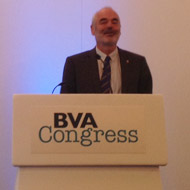Preparation, transparency and humility vital to effective communication

Sir David Spiegelhalter
Winton Professor of the Public Understanding of Risk, Sir David Spiegelhalter, spoke about communicating risk and uncertainty to policy-makers and the public. "There is a need properly to distinguish between high and low risk," he said. "Risk communication is not just about telling people. We, as experts, have to understand the concerns of our audiences and treat them with respect and humility."
Professor Spiegelhalter said it is important to think ahead to how a message is likely to be received by a particular audience before choosing the language with which to communicate it. People tend to hang on to the initial thrust of any message and find it difficult to move away from that viewpoint as things actually change.
He introduced delegates to the concept of the 'MicroMort' and explained, through a series of analogies, how we double our risk of dying every eight years! The media often use analogy a great deal when presenting data, but this method is susceptible to 'spin' and distortion. "It is important to present the facts as 'expected outcome frequency' diagrams and then encourage people to make up their own minds," he said.
"We encounter the 'numeracy paradox', so health leaflets are designed for people of low numeracy. These people, however, tend to be less interested in shared-care/ informed-choice, so that is of limited use; but those people who are interested in numbers lose out.
Professor Spiegelhalter said there are dangers in focussing on absolute risks in low-probability, high-impact acute events. It is important in these cases to provide the relative, as well as the absolute, risks.
We can match the precision of reporting to expressions of confidence. So these range from denial (certainty) to probability distribution (confidence) to a simple list (cautious) to specified inadequacies (doubtful) and unspecified inadequacies (ignorant).
A good approach when communicating serious risk is to follow a rough sequence of "We do not know, we are on the case, avoid the risk if you wish, we shall get back to you once we have resolved the issue.
Begin with carefully chosen words first, then present the numbers then the analogies. "Remember numbers don't speak for themselves. It depends how we package them."



 The Animal and Plant Health Agency (APHA) has updated its online reporting service for dead wild birds.
The Animal and Plant Health Agency (APHA) has updated its online reporting service for dead wild birds.